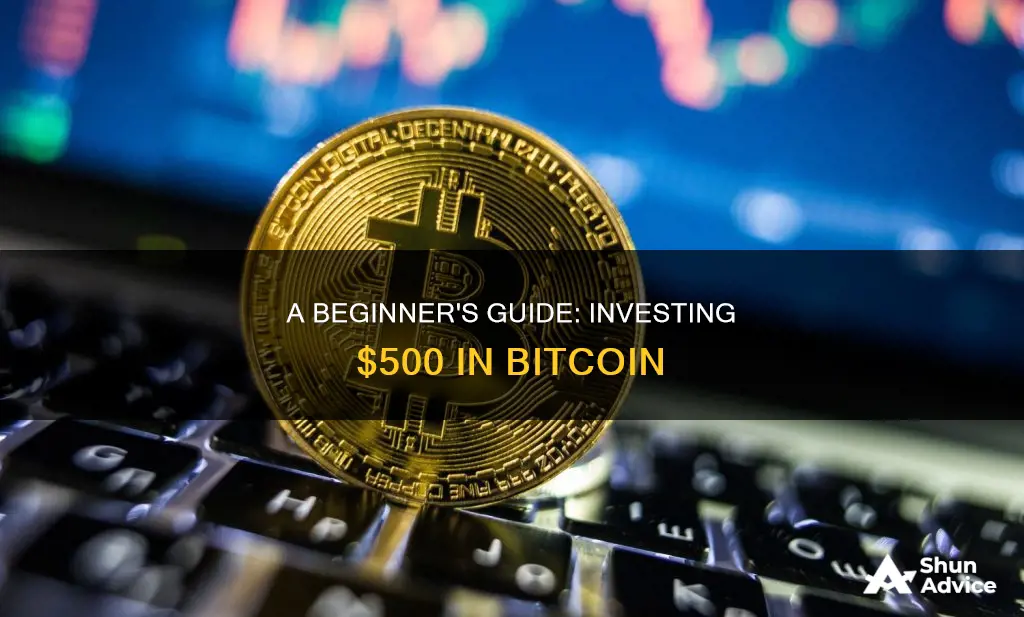
Bitcoin has been on a rollercoaster ride over the past few years, with its value skyrocketing to almost $70,000 in 2021, and it continues to fluctuate. With such volatility, investing in Bitcoin is a risky business. If you are considering investing $500 in Bitcoin, it is important to do your research and understand the currency, its advantages and disadvantages, and the challenges it faces.
| Characteristics | Values |
|---|---|
| Amount | $500 |
| Cryptocurrency | Bitcoin |
| Investment Options | Buying and holding (aka hodling), trading, mining, ETFs, Bitcoin IRAs |
| Risks | Bitcoin is a very risky and volatile asset type |
| Advice | Do your own research, never invest more than you are willing/able to lose, use a Bitcoin wallet, buy from reputable exchanges |

Dollar-cost averaging (DCA)
Investing in Bitcoin can be done in many ways, but it is a very risky asset type. It is extremely volatile, and even the most solid Bitcoin investment should be treated as a high-risk investment. For example, in the past, Bitcoin’s price fell over 80% in the course of several months (this happened a few times throughout its existence).
DCA can be applied to Bitcoin by making smaller, equal investments on an ongoing basis, instead of making large or irregular crypto buys. For example, you can buy a fixed amount of Bitcoin every month, week, or even day throughout the year. This way, you average the price over the course of a whole year. By regularly buying Bitcoin, you will automatically be investing more over time no matter what’s happening in the crypto market. This enables you to grow your holdings and can lower your overall cost basis during dips.
DCA is a consistent, simple way to build your portfolio, especially for beginners or those who don’t want to constantly monitor their investments. If you’d like to invest more in crypto, but find yourself hesitating, leveraging DCA tactics can help immediately relieve your anxiety and build a stable portfolio over time.
There are a few things to keep in mind when considering DCA for Bitcoin:
- Choose the assets you'll be buying: Decide which cryptocurrencies you want to invest in, such as Bitcoin, Ethereum, or others. Conduct thorough research and due diligence on any token you’re considering, especially if you’re new to crypto.
- Decide how often you'll make your buys: Determine how frequently you want to invest, such as monthly, weekly, or daily. Daily or weekly recurring purchases can be more feasible for crypto due to its volatility compared to slower-moving assets like traditional securities.
- Set a rough amount of money you'll be investing: Figure out how much money you can afford to invest, keeping in mind that all investing involves risk. Only invest money you can afford to lose, and avoid exceeding your discretionary income.
- Choose a trustworthy provider/exchange: Select a reputable exchange or provider to make your investments. Compare rates and fees, as some exchanges may charge costly fees on top of each buy.
- Select a secure storage option: Decide where you’ll safely store and manage your crypto investments, such as a custodial crypto wallet or a self-custody wallet. Consider factors like security features, convenience, and accessibility.
Why You Don't Need Bitcoin to Invest in Ripple
You may want to see also

Bitcoin IRA
If you are a US citizen, you can invest in a Bitcoin IRA. This is a tax-free investment account that allows you to invest money to trade in Bitcoin or other cryptocurrencies. The account is aimed at building wealth for your retirement, and money cannot be withdrawn before retirement age without a penalty.
BitcoinIRA is one of the most trusted platforms for this type of investment, with over 200,000 users. It offers 24/7 trading access, tax-free IRAs, and segregated cold storage. The platform has a range of fees, including a 2% trading fee, a 2.99% one-time service fee, and a 0.08% monthly security fee. There is also a minimum investment of $3,000.
BitcoinIRA offers a variety of self-directed IRA options, including traditional, Roth, SEP, and even a Saver IRA. It also supports IRA rollovers and 401(k)s. The platform provides access to over 60 cryptocurrencies, including Bitcoin, Ethereum, Litecoin, and Dogecoin.
The platform is highly secure, using military-grade security and encryption technology. It also has a regulated state-chartered trust company and custody insurance. BitcoinIRA has a strong reputation, with an A+ rating from the Better Business Bureau.
If you are looking to invest in Bitcoin for the long term, a Bitcoin IRA could be a good option. However, it is important to remember that cryptocurrencies are high-risk and highly volatile.
Dogecoin Investing: A Guide for Indians
You may want to see also

Bitcoin ETFs
The first Bitcoin ETFs were launched in January 2024, with the approval of the US Securities and Exchange Commission (SEC). Prior to this, investors could only gain exposure to Bitcoin through futures contracts, mining stocks, or by investing in companies involved in blockchain and crypto-related businesses. The launch of these ETFs has provided a more accessible and regulated means of investing in Bitcoin, particularly for institutional and retail investors who may not have been able to navigate the technical complexities of managing a cryptocurrency wallet or ensuring the security of private keys.
One of the key advantages of Bitcoin ETFs is their convenience. They lower the barriers to entry into the crypto market by removing the need for investors to manage wallets, navigate crypto exchanges, or deal with private and public keys. This makes asset management more straightforward, particularly for those accustomed to traditional investments. Additionally, Bitcoin ETFs offer greater liquidity, allowing investors to buy and sell Bitcoins more easily through their brokerage or brokerage accounts. The regulatory oversight provided by the SEC also ensures transparency and protection for investors. In certain jurisdictions, Bitcoin ETFs may also offer tax benefits compared to holding cryptocurrencies directly.
However, it is important to remember that investing in Bitcoin ETFs comes with risks. The volatility of the crypto market could lead to significant financial losses, and the lack of a clear regulatory framework means there is uncertainty about how risks like fraud, manipulation, and loss of assets will be addressed. Additionally, the large number of coins held by spot Bitcoin ETFs makes them attractive targets for cybercriminals, and successful breaches could result in the theft of millions of dollars worth of Bitcoin. Other risks to consider include management fees, which can eat into returns over time, and tracking errors, which can occur due to liquidity issues, delayed rebalancing, or management fees.
Overall, Bitcoin ETFs provide a simplified and regulated way to gain exposure to Bitcoin's price movements. They have the potential to enhance market liquidity, aid in better price discovery, and attract more institutional participation, thereby playing a pivotal role in stabilizing and boosting Bitcoin adoption. However, investors should carefully consider the risks involved and ensure they have a comprehensive understanding of the crypto market before investing.
Trump's Bitcoin Investment: A Political Gamble?
You may want to see also

Bitcoin trading
- Successful Bitcoin trading requires knowledge and practice. The trading market is occupied by very large players who are waiting for newcomers to come in and lose their money by trading aimlessly.
- Never invest more than you are willing or able to lose. Bitcoin is a very risky and volatile investment, and you should keep that in mind at all times.
- After buying Bitcoins, make sure to move them into your own Bitcoin wallet and never leave them on an exchange. If we’re talking about substantial amounts, a hardware wallet is recommended. If you can’t afford one, a paper wallet is a good alternative.
- Make sure to buy Bitcoins only from reputable exchanges. Sometimes, paying a little extra is worth the security and peace of mind.
- Use Dollar Cost Averaging (DCA) – This means that you don’t buy all of your Bitcoin in one trade but instead buy a fixed amount every month, week, or even day throughout the year. This way, you average the price over the course of a whole year.
- If you are a US citizen, consider investing in a Bitcoin IRA. A Bitcoin IRA is a tax-free investment account that allows you to invest money to trade in Bitcoin or other cryptocurrencies. The account is aimed at building wealth toward your retirement, and the money cannot be withdrawn before retirement age without a penalty.
- ETFs (Exchange-Traded Funds) are an easy way to invest in Bitcoin without having to buy the actual asset yourself. Bitcoin ETFs allow you to invest in cryptocurrency as an asset class without having to understand the blockchain, private keys, or cryptocurrency wallets. However, you can’t freely move your Bitcoin around, send it to friends, or directly buy goods and services with it.
Bitcoins: Safe Investment or Risky Gamble?
You may want to see also

Bitcoin mining
Bitcoin is a digital currency that requires a process called mining. Bitcoin mining is a network-wide competition to generate a cryptographic solution that matches specific criteria. When a correct solution is reached, a reward in the form of bitcoin and fees for the work done is given to the miner(s) who reached the solution first.
Mining is a complex process, but in essence, when a transaction is made between wallets, the addresses and amount are entered into a block on the blockchain. The block is assigned some information, and all of the data in the block is put through a cryptographic algorithm (called hashing). The result of hashing is a 64-digit hexadecimal number, or hash.
Miners are guessing a number that is lower than the target hash. The target hash is a hexadecimal number set to require an average number of attempts.
Miners make these guesses by adjusting the nonce, which is part of the information being hashed. Nonce is short for "number only used once", and it is the key to generating these 64-bit hexadecimal numbers.
The bitcoin reward for mining is halved roughly every four years, or every 210,000 blocks. As of April 2024, the reward for mining a block was 3.125 bitcoins.
The computer hardware required for mining is known as application-specific integrated circuits, or ASICs, and can cost up to $10,000. ASICs consume huge amounts of electricity, which has drawn criticism from environmental groups and limits the profitability of miners.
One way to share the high costs of mining is by joining a mining pool. Pools allow miners to share resources and add more capability, but the potential payout is less when working through a pool.
Rare Coins: High-Risk, High-Reward Investments
You may want to see also
Frequently asked questions
Bitcoin is a very risky asset type. It is extremely volatile, and even the safest option of buying and holding the currency in your personal Bitcoin wallet should be treated as a high-risk investment.
You can use a third-party exchange like Coinbase to buy Bitcoin.
This depends on the price of Bitcoin at the time of purchase.







